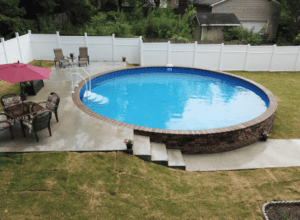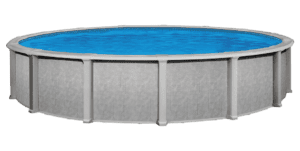
Have you been dreaming of a new pool?
With summer right around the corner, you may be dreaming of a new pool. If splashing around with the family or just cooling off on a hot summer day is for you, keep reading. We’ll take a look at some of the pro’s and con’s of owning a pool as well as the different types of pools, such as above ground, inground, and semi inground.
SEMI INGROUND POOLS
What is a Semi Inground Pool?
A semi inground pool is partially buried in the ground and partially above ground. It’s a great compromise between a fully inground pool and an above ground pool.

Easy to Maintain
Semi inground pools are easier to maintain than fully inground pools because they have less surface area. They also don’t require as much chemical treatment because the water doesn’t sit in the ground like it does with a fully inground pool.
Aesthetic Appeal
Semi inground pools can be an attractive addition to your backyard. They have a sleek and modern look that can enhance the overall aesthetic of your outdoor space. Plus, they’re not as visually imposing as fully inground pools, which some people prefer.
Cons of Semi Inground Pools
Like with any type of pool there are going to be drawbacks to owning it. Since semi inground pools are designed to be similar to an above-ground pool and inground pool, you can run into a combination of issues from both of them. However, the finished product is definitely worth it.
Pros of Semi Inground Pools
There are plenty of good reasons to own a semi inground pool. Not only are they aesthetically designed, but they also provide the best of both worlds.
Cost-effective
One of the biggest advantages of a semi inground pool is the cost. They’re generally less expensive than fully inground pools because they don’t require as much excavation. Plus, the installation process is usually quicker, which can save you money on labor costs.
Versatile
Semi inground pools come in many shapes and sizes, so you can choose one that fits your backyard and your needs. They can be customized with features like waterfalls, lighting, and heating, just like fully inground pools.
Limited Depth
Semi inground pools are limited in depth compared to fully inground pools. They’re usually no deeper than 4-5 feet, which may not be enough for some people. If you’re looking for a pool that’s suitable for diving, a semi inground pool might not be the best option for you.
Potential for Uneven Ground
Because semi inground pools aren’t fully buried in the ground, there’s a potential for the ground to shift or settle over time. This can cause the pool to become uneven or unstable, which can be a safety hazard.
Semi inground pools look beautiful and provide versatility. They can be a great option for homeowners who want a pool but don’t want to commit to a fully inground pool. They’re cost-effective, versatile, and easier to maintain than fully inground pools. However, they do have some potential drawbacks, such as limited depth and potential for uneven ground. Before making a decision, it’s important to weigh the pros and cons and consider your specific needs and budget.
ABOVE GROUND POOLS
There is one definitive advantage of an above ground swimming pool – cost. Without question, an above ground pool is going to cost less than any type of in-ground pool (assuming you don’t build a large deck around it, at which point, you could have just as easily bought an in-ground swimming pool).

Disadvantages of above ground pools
For most people, the biggest disadvantage of above ground pools is their aesthetics. Some can view an above ground pool as an eyesore. Often subdivisions do not allow for their construction within their covenants.
Another disadvantage of an above ground pool is their depth and design limitation. Generally speaking, most above ground pools come in one of 3 shapes—circle, oval, or rectangle.
Above ground pools simply are not built to last a long time. Their metals walls can oxidize and rust easily, and the majority of structures will generally fail in the 8-15 year mark. As a result of this, an above ground pool generally is not factored in as an improvement when a house is being valued and can be a deterrent when trying to sell a house.
VINYL LINER INGROUND POOLS
Advantages of vinyl liner pools
If you’re looking to get an inground pool and have a very limited budget, vinyl liner may be the best choice for you. Their material costs are low and as a result a vinyl liner pool will in most cases cost $5,000 to $10,000 less initially than their concrete or fiberglass counterparts.
With a vinyl liner pool, you have very few limits when it comes to shape and size. With today’s technology, you can make the pool as deep and as curvy/straight/large as you’d like.
Disadvantages of vinyl liner pools
The biggest disadvantage of a vinyl liner inground pool is the liner itself. The material is a polymer and it will break down over time and need to be replaced. Also, the liner can tear easily or become undone from the sides, causing it to slowly fall into the water.
On average, you can expect your inground vinyl liner to last between 7-12 years, with the average cost of replacement (labor, liner, and water) in the $3,000 to $7,000 range, depending on the size/shape of the pool.
FIBERGLASS VS GUNITE INGROUND POOLS
 Which on is best for you. Both have their pros and cons, and the right choice for you will depend on your specific needs and preferences. Let’s take a closer look at both types of pools to help you decide which is the best option.
Which on is best for you. Both have their pros and cons, and the right choice for you will depend on your specific needs and preferences. Let’s take a closer look at both types of pools to help you decide which is the best option.
What is a gunite pool? 
A gunite pool is a type of inground swimming pool that is made from a mixture of concrete and sand. Gunite is sprayed onto the walls and floor of the pool using a high-pressure hose, and then it is left to cure for several days. Once it has cured, the gunite will be very strong and durable, and it will be able to withstand a lot of wear and tear.
What is a fiberglass pool? 
A fiberglass pool is a pool that is made from a standard size mold. Since fiberglass pools are usually pre-formed, they come in a limited number of shapes and sizes. Fiberglass is a very strong and durable material, and it is also quite smooth, so it requires less maintenance than other types of pools.
FIBERGLASS POOLS
Pros
Fiberglass Installation Time. One of the biggest advantages of fiberglass pools is that they can be installed very quickly. In most cases, a fiberglass pool can be installed in just a few days.
Low Maintenance
Fiberglass pools are also very easy to maintain. They are smooth and non-porous, so they resist algae growth. Fiberglass pools also require fewer chemicals than other types of pools.
Fiberglass Durability
Fiberglass is a very strong and durable material, so fiberglass pools will last for many years with proper care.
Different Sizes Available
Fiberglass pools are available in most standard shapes and sizes.
Fiberglass Pool Cost
Fiberglass pool cost depends on a few factors: shape, design, and size. The average fiberglass pool including installation costs between $20,000 and $40,000.
Fiberglass Pools Last Long
Fiberglass pools have a lifespan of 20-30 years but can last as long as 50 years provided they are built by a high-quality manufacturer and installed properly.
Cons
Fiberglass Pools Lack Flexibility
One of the biggest disadvantages of fiberglass pools is that they are only available in a limited number of shapes and sizes. If you want a pool that is custom-made to your specifications, then a fiberglass pool is not the right choice for you.
GUNITE POOLS
Pros
Durability of Gunite Pools
Gunite is a very strong and durable material, so gunite pools will last for many years with proper care.
Gunite Pool Customization (design, features, & finishes)
Because gunite is sprayed onto the walls and floor of the pool, it can be customized to nearly any size, shape, or depth.
Cons
Gunite Pool Cost
Gunite pools are usually more expensive than fiberglass pools. Due to the fact that they are custom built and need to be built on-site, you are looking at a higher cost. Costs are typically within the $50,000 to $100,000 range.
Gunite Pool Maintenance
Gunite pools require more maintenance than fiberglass pools. They are porous, so they require more chemicals to keep the water clean.
Gunite Pool Installation Time
One of the biggest disadvantages of gunite pools is that they can take several weeks to install. Because gunite pools are custom-built on-site, they usually take longer to install than fiberglass pools.
In Conclusion
Both gunite and fiberglass pools have their pros and cons, so it really depends on your needs as to which type of pool you should choose. If you want a pool that is custom-built, has a long lifespan, and can be customized to nearly any size or depth then gunite is the way to go. However, if you want a pool that is less expensive, easier to maintain, and can be installed quickly then fiberglass is the better choice.